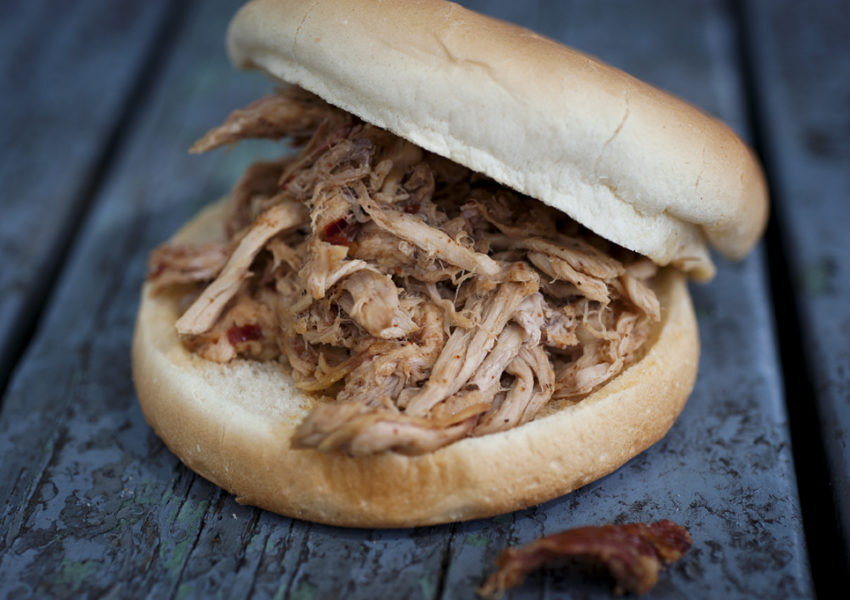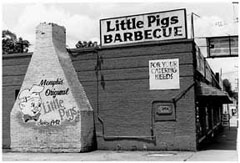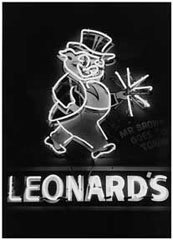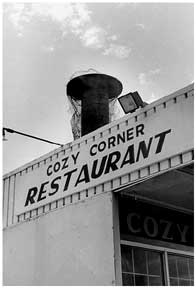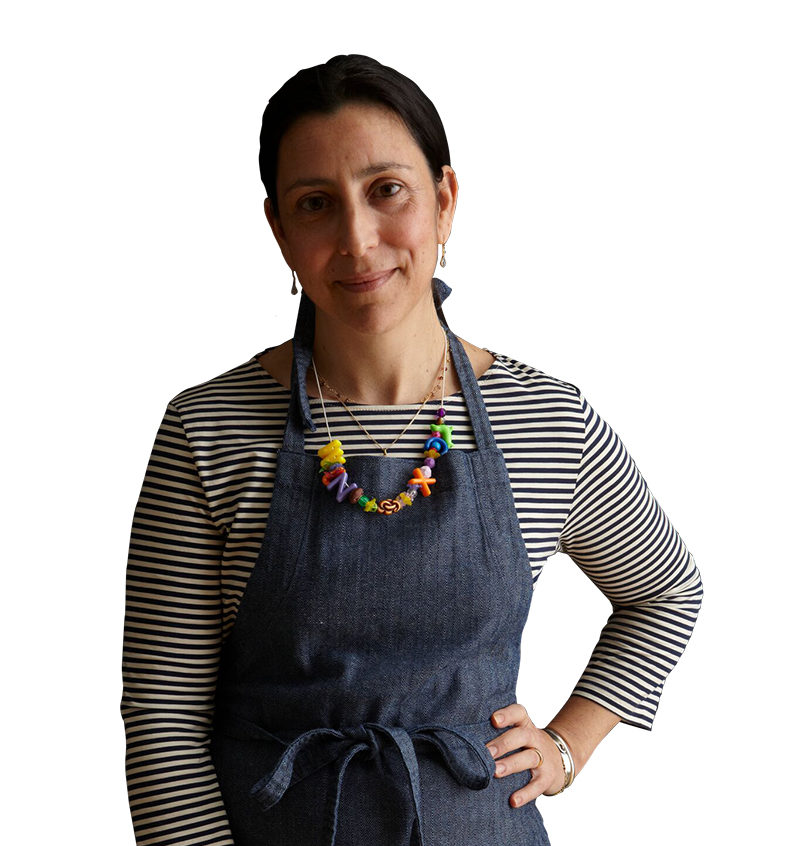< Back to Oral History project: Tennessee Barbecue Project
< Back to Oral History project: Rural Tennessee BBQ Project
< Back to Oral History project: Memphis Tennessee BBQ Project
ORAL HISTORY
Dennis Hays
SUBJECT: Dennis Hays
DATE: March 22, 2003
INTERVIEWER: April Grayson
—–
April Grayson: Could you start by telling me your name and the name of your business, please?
Dennis Hays: I’m Dennis Hays, and it’s Hays Smoke House, is what it is.
And when and where were you born?
When and where? 8-1952, right here.
In Lexington?
Yeah.
How long have you been in the barbeque business?
Seven years.
Seven years.
For the public like this.
And where did you learn the craft of barbequing?
Well, when I was real young, and I wanted—you know, when we would grill steaks and hamburgers and all that stuff, mother always said, “If you want ‘em, you gotta go cook ‘em.” So that’s sort of where it evolved from.
 So it was kind of a self-taught thing?
So it was kind of a self-taught thing?
Yeah, yeah.
And then, how long has this Smoke House been here?
We been here two years, been here exactly two years this weekend.
Where was your business before that?
We had a small business down the road about a mile that would seat 40 people, is what we had.
And tell me about the slaughterhouse, as well, because I know that’s an important part of your business.
Well, we’re the only USDA-inspected slaughter plant in about 80, 90 miles of here, and nearly the only one that sells whole barbeque hogs to people where they can come and buy ‘em to cook theirselves or any of the barbeque pits that wants to do it that way. In this area here, like in say a 30-mile area here, this is a hotbed for whole hog barbeque. And you’ll go out of business right around here if you try to cook shoulders. It don’t make no difference if it’s delicious—that’s just the way this has always been.
So is it because of the tradition? People expect that?
That’s it. That’s what it is. Ninety percent of the people that walk through my doors, they either want tenderloin, middling, ham, shoulder, something. They got something they ask for. They don’t just come in and say, “I want barbeque.” When they want it by the pound, they got something specific they ask for.
So about how many businesses in this area do you supply hogs to?
I think that we were talking about that here the other night. I think it’s somewheres like 14, 12, 14, somewheres in there, barbeque pits.
In Chester County, everybody that we’ve talked to gets their hogs from you.
Yeah, yeah, they do.
Now where do you—who raises the hogs that you slaughter?
Well, there’s still people here in the county that’s got hogs…. And about a year and a half ago, I tied up with a gentleman that’s got 100,000 head, because I was afraid the supply might become a problem. And so I buy hogs from him every week, too.
Is there something particular that makes a barbeque hog, as opposed to something else? Is there something special that you look for? Or is a hog a hog?
Well, everybody’s got their own different opinion. I personally, I like a hog that will have like close to like 9.9- to 1-inch back fat, for my barbeque hogs, because I like a little fat with mine, where it makes it more tender and more juicy. Some people prefer a lean hog that don’t have no fat at all to it, and I mean I have customers that want, and I order hogs for each one different. There’s some people, they don’t want no fat at all on theirs to cook. I like fat to cook with mine. I think it gives it a better taste. That’s just me, personally.
About how many hogs do you supply to people a week?
Well, it depends on the time of the year and everything like that. But most of the time, they’ll be somewheres around 75, 80 hogs that go through the place up there to barbeque places most weeks.
And do y’all slaughter other animals as well?
Yeah, yeah.
What? Cattle?
Cattle. We do some lamb and sheep, but it’s mainly hogs and cattle.
Were you in the slaughter business or the barbeque business first?
I was in the barbeque business first, is what I was in first.
And what prompted you to get in the slaughter business?
I wasn’t too happy with the way things was going. I was having trouble getting my product. Everybody else was having trouble getting theirs, and the fellow who owned it, he didn’t run it, he hardly runned, and one day he just come over there and said, “I’m tired of messing with it, I’m gonna sell it. I’d like to sell it to you if you want it.” And we talked and messed with it there for about three or four weeks, and I finally bought it.
You mentioned earlier that you were going to expand the slaughter business to this location as well?
Nah. Down the road about three miles from here.
Ok.
Sort of, it’s on the main road here, but it’s out in the country, out in the county.
Ok. But you’re planning to build another one? Oh, oh, ok. It’s not going to be here.
No, it’s not gonna be here.
And you’re building that new facility so it will be bigger, or—
Yeah, it’s gonna be a lot bigger. We’re gonna do a lot of different things. We’re gonna make breakfast bacon at this one. We’re gonna make sausage. We’re gonna make stuff we can sell to supermarkets. And going back and pack whole loins and whole hams and whole shoulders, and that kind of stuff.
Well, at your restaurant here, what’s your specialty? Would it be your barbeque sandwich?
Probably more talk about the ribs than anything.
Can you tell me about your cooker, because I know it’s pretty unique, and you said you designed it. Can you sort of describe the cooker and how it works?
Well, it’s a rotisserie, and the main thing, it’s got, it’s got electric cylinoids (sic) that open and close dampers that let air in. I keep it set at like 175 [degrees F], and whenever the heat hits 180, the damper closes. Then whenever it cools down to 160, the damper opens back up again and lets it get air and heats back up again. And you don’t ever have to worry about it getting over 180 degrees because you got those cylinoids (sic) there that shut all the air off, and it’s not gonna catch on fire, burn up, anything else. And you don’t have much trouble with scorched meat because, you know, you just keep it a constant temperature all the time.
And the heat source is where, and what do you use for your fuel?
Well, I use hickory, is what I use. There is a drumstick mill that makes drumsticks for bands, about six, seven miles across the country here. Last year I think they made about 5 million of ‘em. And their blanks that won’t qualify, we go over there and haul ‘em over here, and I load ‘em into that big burner I got out there. And we use those hickory blanks to get coals with to fire the meat.
 How often do you have to replenish your wood?
How often do you have to replenish your wood?
What I usually do is I usually get three loads every two weeks, is what I do. Three bob-truck loads every two weeks.
How does your—describe how you make your coals and then get them into your—
I just got a big burner out there that I load with my backhoe. And whenever—it takes ‘em about an hour and a half to burn down to coals, and I go out there and just take a big corn scoop shovel, scoop that I got, and I roll those coal boxes out and put all the coals in ‘em, and then I roll ‘em back in and shut ‘em back up.
How long do you cook a hog?
It takes 18 hours the way I cook it to get it done, is what it takes. You can cook it quicker in one of them cookers than that, but it won’t be real good. You gotta cook it 18 hours for it to be good. Most of the time it takes mine about 20 hours. If I get caught real busy, and I don’t get my hogs on in time, you know, I can get ‘em done in 18 hours, and I’m satisfied with ‘em, but I like 20 hours, is what I like.
So, when you put a hog on, can you take me through that process, that 18 to 20 hours?
Well, really we just put the hog on, and I fire it. And I’ll go back in about an hour and a half, and I’ll fire it again. And I’ll fire it about every two hours after that, up ‘til it’s been on about 12 hours. Then at about 12 hours, most of the time you’ll fire it, then it’ll be good for up ‘til about 17, 18 hours. There’s about a four or five range then. Sometimes I have to fire it one more time, sometimes I don’t.
Do you flip it at some point?
No, that’s the reason for the rotisserie. Before I had the rotisserie, I had to turn the hogs and everything, and that was one of the reasons I built that, so I wouldn’t have to turn these hogs. Took a lot of labor off of it.
So when you go to pull it off, do you have a set process? You start at a certain spot and you work on the hog a certain way?
Well, what I try to do when I pull it—‘cause like I said, most of the people who come through here have got a specific thing that they want—and I try to keep the middling at one end, the tenderloin at the other. You know, I try to sort of keep it separated as we pull it and go, is what I do. So it’s a lot easier on the ladies when they’re serving.
Well, tell me about your sauce.
Well, my wife makes all the sauce, and I can’t tell you nothing about it, ‘cause I really don’t know that much about it. She makes it, she handles all that.
What’s her name?
Judy.
Judy.
Yeah. And we sauce our meat while we cook it. A lot of people will tell you that it’s against the law to do that. The USDA and the state health people told us they were glad we did ‘cause it’s a vinegar base, and that also helps kill bacteria. And we sauce ours while we cook ours.
 And do you have a mild and a hot?
And do you have a mild and a hot?
Yeah. And it’s what it says it is. Hot’s hot.
And do you serve slaw, slaw on the sandwiches?
Yeah. On the sandwiches, on the side, whatever they want.
How many kinds of slaw do you have?
We have two. We have what they call a vinegar-based slaw, and then we have a coleslaw, a mayonnaise-based slaw. And we’ll sell like 95 percent mayonnaise slaw over vinegar slaw. We don’t sell a lot of vinegar slaw.
How many people request the sandwich without slaw? Percentage wise.
Maybe five percent. Not many.
What other sides do you have?
We have beans, potato salad, French fries, onion rings, chips.
Do y’all make all of that here?
Everything is made here. All of the desserts are homemade, made here.
What kind of desserts do y’all have?
Well, we have a lot of banana pudding, a lot of chocolate cake, Boston crème pie, and strawberry pie, when they’re in season, which they just come in. We started having strawberry pie again two weeks ago.
Have you changed anything about your process or your recipes since you started in business?
Changed probably a little bit. If I could say anything, probably changed the way I cook a little bit. I’m a little more patient with it than I used to be. But really that’s not that—I’ve got better equipment than I did to work with. Like I said, that out there, when I first started I didn’t have—I had the older style cookers without the dampers and everything on it. And you know, sometimes you’d scorch it, get it too hot, that type thing. And you had to control, you had trouble controlling the heat, but when I went with this right here, that eliminated that problem, and I mean, it just made life a lot easier for me.
And you said it was custom-made after your design?
Yeah.
Can you tell me what it’s made from?
Well, that tank out there is a big fuel tank that come out of the ground. It was about two years old when it was dug up, and we made it out of it.
Joe York: How much did you have to pay—oh, no dollars and cents, right? Nevermind.
I don’t mind about that.
JY: How much is one of those? How much did you have to give for it, or did you trade?
Twenty-thousand dollars.
JY: Shoot!
Custom made.
Yeah, the small one I got there, it was eight [thousand dollars]. You know, it’s a lot of labor. It’s not that much dollar wise in the material, but there’s just lots of labor, you know, goes in there.
‘Cause the measurements—how big is that one?
That one’s twenty foot by seven foot.
It’s huge.
The gentlemen that made that, him and his father worked on that three weeks. They brought it over here, and we worked on it then about a half a day, getting a couple of kinks out of it, and then we went to work.
Tell me about the atmosphere of the restaurant and how important that is. You mentioned it was important to your wife, earlier.
Well, we talked about it, whenever we come in. We felt like a barbeque place oughta be a wood place. I mean, we could put up a metal building cheaper than what we put up here, but we felt like if it was barbeque, it should be wood, ‘cause that’s what barbeque is, you know. And so we put up this type of building here. [Points to the walls] This is all native pine here that was grown here in the area, and it was bought, planed—we planed it—put it up, just nailed it up like that. It’s all it is. And all these antiques in here—my wife loves antiques. She had a lot of this when we come here from the other place that was ours. And when we decided we was gonna do this, about a year before she started collecting more antiques, and we haven’t got ‘em all up yet. We added on this new room in here.
So mostly what’s in here seems to be antique farm tools and farm equipment, kitchen tools.
Kitchen tools, yeah. That’s a big ol’ antique hand corn sheller, right there.
Tell me about your clientele. Are they mostly regulars, or how many people do you serve a week? Things like that.
Depends from week to week. If it’s snowing and bad like it was there for a while, things is slow. When it’s pretty like today, you’re always real busy. That type thing. And our deal is mainly a word-of-mouth thing. We advertise on this local radio station up here some, but it’s mainly word-of-mouth. We let everybody do their own thing.
Do you mind telling me how many hogs you cook a week and how many people that serves?
Well, most of the time, you’ll get somewheres around 45, 50 pounds barbeque out of a hog. If you’re making sandwiches, that’ll serve somewhere around 175 people, is what that’ll do.
One hog?
Yeah.
About how many do you cook a week?
It depends on the week. On the holiday weekends, you cook a lot more. On the normal weeks, you know, you cook four to five, that type of thing. But we only have barbeque on Friday and Saturday. I have the other business, the slaughterhouse that I’m at. I work at it ‘til Thursday, and two nights a week is all I can just about near stay up. I’m hard to please about all this. Sometimes I can’t even please myself, and so I don’t let nobody else do no cooking but me. And that’s why we’re just open two nights a week.
Two nights a week. How do you see the future of this business here?
Well, it’s been going ever since we’ve started it. We come up here and we finally have a lot of room, a lot of parking, a lot of seating. We stay—we’re fortunate, we stay busy.
Do you have kids that might take over at some point?
I’ve got two sons. I’ve got one son that works in Nashville with Sysco Foods, and I’ve got another one that helps me run the slaughter business up there, that type thing.
So it kind of runs in the family a little?
He likes that up there. He don’t care a whole lot about this down here. But he likes that up there.
Which do you like more, the slaughterhouse or—
Oh, I like talking to people! You can tell by me sitting here talking to y’all. I enjoy talking, mixing, and mingling. [to an employee] Alright, bye! [to AG] Mixing and mingling. I’ve always liked to talk a lot.
Ok. What’s your typical work day when you’re at the slaughterhouse?
From 6:00 to about 4:00.
And that’s just pretty steady slaughter stuff? Does it vary at all, or—
Well, usually we start there at 7:00, is when the federal inspector gets there, and we start. I have a federal inspector works up there, tells us when we can start and everything. He’s there usually about 15 to 7, and we start at 7, something like that. Most of the time we’re done between 2:30, 3:00, then we clean up for about an hour and a half, that type of thing.
And then your typical day at the restaurant. It’s two days a week, you said?
Most of the time, I get here Thursday morning about, somewheres around 9 or 10:00, and I don’t leave ‘til Saturday night somewheres around 9 or 10:00. I’m here for the duration for that one, when I get here.
So do you have time for anything else in your life other than your business?
I get to go fishing every now and then! Sure do.
JY: Can you tell me about killing a hog? What it’s like. I mean, like how you do it, start to finish….
We use a captive bolt. We also use live ammunition to do ours with. Both of those are legal. With the new one we’re going to, we’re probably going to be using an electric stunner, more than likely is what we’re gonna be using. The PETA [People for the Ethical Treatment of Animals] people come with the USDA about two months ago, inspecting all the slaughter facilities across the nation. They went to all of ‘em. And what they done, you could score a hundred out of this, and they stayed with us all day, and we scored an 80. And they told us that was very acceptable. And believe it or not, they like the live ammunition better than anything else because, what they said was that they felt like that wasn’t as cruel as the other stuff was… [An employee says, “I’m gone.” Dennis says, “Alright.” ] That they didn’t think that was as cruel as the stunning. ‘Cause a lot of times the stunning, you stun ‘em and if you don’t get right to it, they’ll come back to before you get ‘em bled out. Then they’re kicking and lunging and that type of thing.
 And live ammunition is more instant?
And live ammunition is more instant?
That’s what they said. That was—you know, that’s what they told us up there. That’s all we have to go by. But anyway, we managed scoring 80 out of 100, and they said that was, you know, very acceptable.
Have you ever done barbeque contests?
Naw. Don’t ever have the time for that. Once I get through here, I get all I want right here. We just stay here and try to tend to our business. That’s it.
…Well, couple more questions. One is what do you think makes your barbeque that you serve at this location distinctive? Do you have any specialties that you feel are purely yours?
Well, two things that I would say. The cooker out there that you looked at. The way it’s designed. And I think my wife makes some real good barbeque sauce. Those two right there. And I mean, we put out a lot of effort in it. Me or her one is here all the time, you know. And I’m real, real fortunate, I’ve got three fulltime hands back there that are older ladies that, you know, they take a lot of pride in their work. They make the desserts, a lot of ‘em, and they, they just work here all the time. And I mean, if, when I’m not here, I’m not worried about it, because they treat it just like it’s theirs. They treat the customers real friendly and cordial and everything, and they all like to talk like I do, and I mean, you know, they’re real friendly with everybody. And that really helps. I mean, if you can have a clean place, and food’s good, and you’re friendly to people, it’ll pretty well take care of itself.
What about, do you have any philosophies, general philosophies about cooking barbeque? And the preparation of it?
Just, trial and error, that’s about all I can tell you. Just get in there and start. You can get a basis and start and, you know, everybody has their different way that they like to do things, the different taste that they shoot for, and that type thing. And up here, if I don’t like it, we don’t serve it. That’s what it boils down to. I let them do whatever they want, but if it’s something I don’t like, we don’t serve it. And you can tell by looking at me, I like to eat.
Well, what about—do you feel like hickory is imperative? Would ever consider cooking a different way, as far as with gas or electric?
Naw, I won’t cook. In this area here, where we’re at, it don’t make no difference how good a business you got, if you started cooking with gas or electric tomorrow, and people knew about it, they wouldn’t come eat. It would make no difference if it was as good, now, as the other one, when they find out it’s not wood-cooked, they just don’t want no part of it. That’s this area here. It may not apply everywhere else, but it does apply right here. Because they’ve been places that have come into town here that tried to open up and cook with electric or gas, and most of the time, in three or four months, they’re closed and gone.
Great. Well, anything else you want to add?
Naw, nothing that I want to add.
Well, I appreciate it very much.
You’re welcome.



